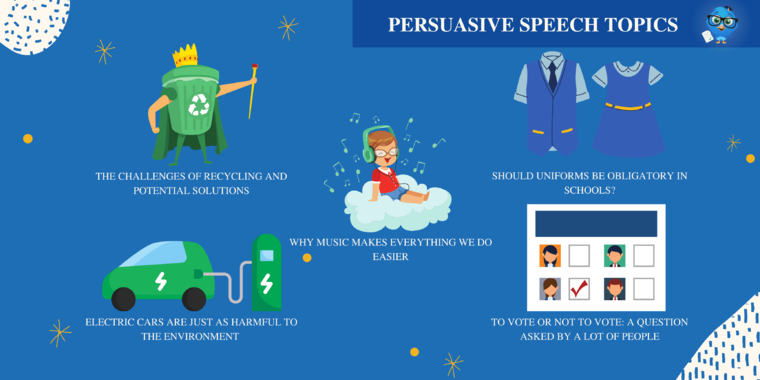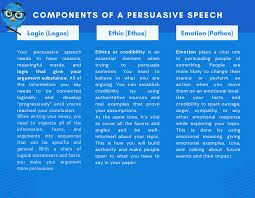

Introduction
Public speaking is one of the most powerful tools students can master. Whether you’re trying to inspire your classmates, persuade your teacher, or prepare for a debate competition, the right persuasive speech topic makes all the difference.
A persuasive speech is not just about presenting information—it’s about convincing your audience to see the world through your perspective. To do this successfully, you need a strong topic, clear reasoning, and an engaging delivery.
But here’s the challenge: choosing the right topic. With so many options out there, students often feel overwhelmed. That’s why we’ve put together this ultimate list of 50+ persuasive speech topics and ideas—from fun and lighthearted themes to thought-provoking debates about technology, society, and ethics.
What is a Persuasive Speech?
Have you ever listened to someone speak and felt completely convinced to see things their way or even take action right after? That’s the power of a persuasive speech. Unlike a simple informative talk that shares facts, a persuasive speech goes further—it aims to influence your thoughts, beliefs, or actions.
Why Persuasive Speeches Matter
We encounter persuasion every day. Politicians use it to win votes, marketers use it to sell products, and students use it in class debates or presentations. The goal is always the same: to make the audience agree with a specific point of view or follow a suggested course of action.
Key Ingredients of a Persuasive Speech

To truly move an audience, a persuasive speech combines three powerful elements:
How EssayAssists.com Helps Students Write Persuasive Speeches
Writing a persuasive speech can feel overwhelming, especially when you’re not sure how to structure your arguments or choose the right words to convince your audience. That’s where EssayAssists.com steps in. The platform provides professional academic support designed to help students craft powerful, effective, and audience-focused speeches.
1. Topic Selection Made Easy
One of the hardest parts of writing a persuasive speech is deciding what to talk about. EssayAssists.com helps students brainstorm and narrow down relevant, interesting, and debatable topics. Instead of struggling with broad ideas, students receive tailored suggestions based on their interests and academic level.
2. Research and Evidence Support
A good persuasive speech needs solid facts, statistics, and credible sources. EssayAssists.com provides students with well-researched material to strengthen their arguments. This ensures that the speech doesn’t rely only on opinions but is backed by evidence.
3. Clear Structure and Organization
Many students lose marks because their speeches lack a strong flow. EssayAssists.com guides students in following the classic persuasive speech structure:
- Attention-grabbing introduction
- Logical, evidence-based body paragraphs
- Rebuttals to counterarguments
- Memorable conclusion with a call to action
This step-by-step approach makes speeches more convincing and easier for the audience to follow.
4. Language and Tone Enhancement
Persuasive speeches need to sound confident, inspiring, and audience-centered. The platform helps students refine their word choice, tone, and style so the speech sounds professional yet natural. Whether it’s making a speech more emotional or more logical, EssayAssists.com ensures the right balance.
5. Drafting and Polishing
Students can upload their draft speeches and receive editing, proofreading, and feedback services. Experts at EssayAssists.com check for grammar errors, clarity issues, and weak arguments—helping turn a rough draft into a polished final speech.
6. Confidence in Delivery
Beyond writing, EssayAssists.com also provides tips on speech delivery, including pacing, voice projection, and audience engagement. This extra support ensures that students don’t just write persuasive speeches but also deliver them with confidence.
7. Time-Saving Support for Busy Students
With multiple assignments, exams, and extracurricular activities, students often feel short on time. EssayAssists.com saves hours of stress by providing expert guidance that makes the speech-writing process faster and more efficient.
Whether you’re preparing a classroom assignment, a debate competition, or a public speaking event, EssayAssists.com helps students transform their ideas into impactful persuasive speeches that leave a lasting impression.
- Clear Purpose – The speech focuses on convincing the audience about a belief, idea, or action.
- Strong Claim – At the heart of every persuasive speech is a central argument or thesis.
- Logical Arguments (Logos) – Facts, evidence, and logical reasoning that make the argument solid.
- Emotional Appeal (Pathos) – Tapping into feelings, values, and emotions to connect deeply.
- Credibility (Ethos) – The speaker must appear trustworthy, knowledgeable, and authentic.
- Call to Action – Ending with a push for the audience to do something, whether it’s changing a habit, supporting a cause, or rethinking their perspective.
🚀 Top 10 Persuasive Speech Topics for 2025

Looking for the most relevant, trending issues this year? These hot topics resonate with today’s world:
- Should artificial intelligence be regulated like nuclear technology?
- Is social media more addictive than drugs?
- Should mental health days be mandatory in schools and workplaces?
- Will universal basic income solve or worsen economic inequality?
- Should performance-enhancing drugs be allowed for college athletes?
- Do facial recognition technologies violate basic human rights?
- Is climate change anxiety damaging young people’s mental health?
- Should free healthcare be a basic human right worldwide?
- Is virtual reality the future of online learning or just a fad?
- Should stricter gun control laws be introduced for national security?
Persuasive Speech Topics for College Students
College is a time to shape opinions, explore ideas, and challenge perspectives. These topics reflect issues that matter to young adults:
- How marketing influences consumer psychology.
- Should water be recognized as a global priority?
- Are colleges doing enough to bridge the digital divide?
- Should internship experience be mandatory for graduation?
- Do rising tuition costs require stricter government regulation?
- Is it ethical for AI to be used in academia?
- Should college athletes be paid?
- Should community service be a graduation requirement?
- Does political correctness encourage or limit critical thinking on campus?
- Is cultural competency a necessary skill for all majors?
Persuasive Speech Topics for High School Students
High school speeches should feel relatable. These topics touch on issues students face daily:
- Should homework be optional for high school seniors?
- Do standardized tests truly measure intelligence?
- Should students have a say in how schools spend their budgets?
- Do uniforms suppress individuality or create equality?
- Should schools provide free mental health counseling?
- Should financial literacy be taught in high school?
- Should cell phones be banned during class?
- Should schools start later to support teen health?
- Is a gap year before college beneficial?
- Should cafeterias serve only healthy food?
Easy Persuasive Speech Topics

Perfect for beginners—simple but still engaging:
- Should schools eliminate homework completely?
- Is reading better than watching TV?
- Should teenagers work part-time jobs?
- Should recycling be mandatory in schools?
- Should video games have stricter age ratings?
- Are pets good for emotional well-being?
- Is bottled water better than tap water?
- Should every family own a pet?
- Should fast food ads be banned on TV?
- Should public transport be free for students?
Unique Persuasive Speech Topics for College Students
Want to stand out? Choose a topic that challenges conventional wisdom:
- Are electric cars really eco-friendly?
- Is society romanticizing depression?
- Should political leadership have an age limit?
- Could minimalism solve overconsumption?
- Should voting rights have an upper age limit?
- Is privacy still possible in the digital age?
- Should we redefine what it means to be successful?
- Are influencers reshaping modern values for the worse?
- Would universal plant-based diets save the planet?
- Is solitude underrated in today’s connected world?
Funny Persuasive Speech Topics
Humor is a powerful persuasion tool. Here are some lighthearted ideas:
- Why procrastination is actually a superpower.
- Should naps be mandatory at school or work?
- Why pizza should be its own food group.
- Are pets secretly judging us?
- Should chocolate be free on Mondays?
- Why do square pizza boxes hold round pizzas?
- Should complaining be considered a valid hobby?
- Why cat videos still dominate the internet.
- Are skinny jeans for men a crime against fashion?
- Is life better when you pretend you’re in a movie?
Mental Health Persuasive Speech Topics
Mental health is one of the most important conversations today:
- Should schools offer regular emotional wellness screenings?
- Does climate change news increase anxiety?
- Should therapy apps replace traditional counseling?
- How does social media impact adolescent mental health?
- Should workplace wellness days become the norm?
- Is overachievement causing burnout in teens?
- Should sports culture destigmatize psychological support?
- Are mental health days as important as sick days?
- Should funding for mental health research increase in colleges?
- Can peer pressure trigger long-term emotional struggles?
Technology & AI Persuasive Speech Topics
As technology evolves, so do ethical questions:
- Can we trust AI to make ethical decisions?
- Should governments regulate tech companies more strictly?
- Are self-driving cars safer than humans?
- Should robots have rights in the future?
- Is AI-generated art real art?
- Can virtual classes completely replace traditional schools?
- Should AI decide who gets a job?
- Is digital surveillance justified for public safety?
- Should cryptocurrency replace traditional money?
- Should humans colonize Mars with advanced technology?
How to Choose a Good Persuasive Speech Topic
When it comes to delivering a persuasive speech, the topic you choose can make or break your presentation. A strong topic doesn’t just capture attention—it also makes it easier for you to build powerful arguments and connect with your audience. But with so many possibilities out there, how do you decide on the right one? Let’s break down the steps to help you choose a persuasive speech topic that stands out.
1. Know Your Audience
The first step in choosing a great persuasive speech topic is understanding who you’ll be speaking to. Consider:
- Age group – Are they high school students, college peers, or professionals?
- Interests – What do they care about, and what issues might resonate with them?
- Knowledge level – Do they already know a lot about the subject, or will you be introducing it?
A topic that aligns with your audience’s concerns will grab their attention and keep them engaged.
2. Choose a Topic You’re Passionate About
Persuasion is more powerful when you truly care about the subject. If you’re excited and invested, your audience will feel that energy. Think about issues you discuss often, causes you support, or debates you enjoy engaging in. Passion fuels confidence, which is key in delivering a convincing speech.
3. Make Sure the Topic is Debatable
A persuasive speech requires more than just sharing information—it’s about taking a stand. Choose a topic with at least two clear sides so you can argue your position effectively. For example, instead of picking “The importance of recycling” (which most people already agree on), frame it as “Should recycling be mandatory in all cities?” This way, you open the floor for debate.
4. Narrow It Down
Broad topics can overwhelm both you and your listeners. Instead of picking a general theme like “education,” focus on something specific, such as “Should college education be free for all students?” A narrow topic keeps your speech structured and impactful.
5. Check for Research and Evidence
Persuasion relies heavily on facts, examples, and statistics. Before finalizing your topic, make sure there’s enough credible information available to back up your arguments. A great topic with no supporting evidence will weaken your speech.
6. Think About Timeliness and Relevance
Current and trending topics often capture more interest than outdated ones. Consider what’s happening in the world today—politics, technology, environment, or culture. A timely topic makes your speech more relatable and engaging.
7. Balance Between Familiar and Fresh
While common topics are safe, they can sometimes bore your audience if they’ve heard them too many times. On the other hand, obscure topics might lose them entirely. The best approach is to choose something familiar but give it a unique angle.
Here’s a quick formula to brainstorm instantly:
👉 Should [X] be [Y]?
For example:
- Should college be free?
- Should homework be optional?
- Should AI replace teachers?
Components of a Successful Persuasive Speech

A persuasive speech is more than just sharing opinions—it’s about inspiring your audience to see, feel, and believe in your message. Whether you’re speaking in a classroom, at a debate, or on a public stage, the effectiveness of your speech depends on how well you structure and deliver it. Below are the essential components that make a persuasive speech successful.
1. A Strong Hook
The beginning of your speech should grab attention right away. You can start with:
- A thought-provoking question
- A powerful statistic
- A relatable story
- A bold statement
A strong hook sets the tone and makes the audience eager to hear more.
2. A Clear Thesis Statement
Your thesis is the backbone of your speech—it tells your audience exactly what you are trying to persuade them to believe or do. A strong thesis is:
- Concise
- Specific
- Debatable
For example: “Schools should adopt a four-day school week to improve productivity and student well-being.”
3. Logical Structure and Flow
A successful persuasive speech follows a logical structure so the audience can easily follow your reasoning. Common structures include:
- Problem-Solution: Identify a problem and propose a clear solution.
- Cause-Effect: Explain the cause of an issue and its impact.
- Comparative Advantage: Show why your idea is better than the alternatives.
4. Solid Evidence and Support
Persuasion requires proof. Use credible sources, real-life examples, data, and expert opinions to back up your claims. The stronger your evidence, the harder it is for the audience to dismiss your argument.
5. Emotional Appeal (Pathos)
Beyond logic, persuasion also appeals to feelings. Use stories, vivid language, and relatable experiences to connect emotionally. When people feel moved, they are more likely to take action.
6. Speaker Credibility (Ethos)
Your audience needs to trust you. Establish credibility by:
- Demonstrating knowledge of the topic
- Being confident and respectful
- Showing sincerity and good intentions
7. Call to Action (CTA)
Every persuasive speech should end with a clear call to action. Tell your audience exactly what you want them to do, whether it’s changing their mindset, adopting a habit, or supporting a cause.
8. Memorable Closing
Leave your audience with something they will remember. This could be a powerful quote, a striking fact, or a challenge that lingers in their minds long after your speech ends.
Bonus Tips for Writing & Delivering a Persuasive Speech

Delivering a persuasive speech is more than just presenting facts—it’s about influencing your audience’s thoughts, emotions, and actions. While you may already know the basics of structuring your speech and supporting your ideas with evidence, there are extra strategies that can make your speech stand out. Here are some bonus tips for writing and delivering a persuasive speech that can help you win over your audience.
1. Start Strong with a Hook
The first 30 seconds of your speech can make or break your audience’s attention. Begin with a surprising statistic, a thought-provoking question, or a relatable story. A strong opening sets the tone and makes your audience want to listen.
2. Use the Rule of Three
People remember things better when they are grouped in threes. Instead of overwhelming your audience with too many points, focus on three main arguments. For example: “This policy will save money, improve safety, and create jobs.”
3. Speak to Both Logic and Emotion
A persuasive speech should balance logos (logic) and pathos (emotion). Facts, statistics, and expert opinions strengthen your argument, while stories, metaphors, and passionate delivery make it relatable and moving.
4. Anticipate Counterarguments
Your audience may have doubts or objections. Address these directly in your speech to show that you’ve considered multiple perspectives. By acknowledging the other side, you appear more credible and convincing.
5. Use Repetition for Impact
Repetition helps ideas stick. Repeat key phrases or slogans at strategic moments. This creates rhythm, reinforces your message, and makes it easier for your audience to remember.
6. Pay Attention to Body Language
Non-verbal communication is as powerful as words. Maintain eye contact, use purposeful gestures, and stand confidently. A strong presence makes your message more believable.
7. Control Your Pace and Tone
Don’t rush through your speech. Pause for emphasis after important points and vary your tone to keep the audience engaged. A monotone voice can weaken even the strongest arguments.
8. Personalize Your Message
Adapt your speech to your audience. Think about their values, experiences, and concerns. A speech that feels tailored to their needs will have a greater persuasive impact than one that feels generic.
9. End with a Call to Action
Every persuasive speech should inspire action. Clearly tell your audience what you want them to do—whether it’s changing a habit, supporting a cause, or rethinking an opinion. End powerfully so your message stays with them.
10. Practice, Practice, Practice
Confidence comes from preparation. Rehearse in front of friends, record yourself, or practice in front of a mirror. The more comfortable you are with your speech, the more persuasive you’ll be.
Persuasive Speech Topics FAQs

When it comes to persuasive speeches, students often have many questions. Below are some of the most frequently asked questions (FAQs) along with clear answers to help you prepare a strong, engaging, and convincing speech.
1. What is a persuasive speech?
A persuasive speech is a type of speech where the speaker tries to convince the audience to adopt a certain viewpoint, belief, or action. It uses logic, emotions, and credibility to persuade listeners.
2. How do I choose a persuasive speech topic?
Choose a topic that:
- Interests you personally
- Is relevant to your audience
- Has enough supporting evidence
- Sparks debate or discussion
This ensures your speech feels authentic and engaging.
3. What makes a persuasive speech topic “good”?
A good topic is:
- Controversial (people have different opinions)
- Specific (not too broad or too vague)
- Timely (relevant in today’s world)
- Audience-centered (matters to your listeners)
4. What are some common categories of persuasive speech topics?
- Education (e.g., should homework be banned?)
- Health & Lifestyle (e.g., is a plant-based diet better?)
- Technology (e.g., should social media have age limits?)
- Environment (e.g., should single-use plastics be banned?)
- Politics & Society (e.g., should voting be mandatory?)
5. How long should a persuasive speech be?
Typically, persuasive speeches last 5–10 minutes in class settings. However, the length depends on the assignment or event requirements.
6. How do I structure a persuasive speech?
Follow this outline:
- Introduction – Hook the audience and state your position.
- Body – Present main arguments with evidence.
- Counterarguments – Address opposing views respectfully.
- Conclusion – Summarize and give a strong call to action.
7. What strategies make a persuasive speech effective?
- Use stories and examples for emotional appeal.
- Back up claims with facts and statistics.
- Maintain eye contact and confidence.
- End with a memorable statement or call to action.
8. Can I reuse persuasive essay topics for speeches?
Yes, many persuasive essay topics work well for speeches. Just remember that speeches require a more conversational tone and engaging delivery.
9. Should I always pick a controversial topic?
Not always. While controversy sparks debate, even simple topics (like school uniforms or healthy eating) can be persuasive if presented with passion and evidence.
10. Where can I find persuasive speech topic ideas?
You can find ideas from:
- Current events and news
- Classroom discussions
- Personal interests and hobbies
- Online lists of persuasive topics (like this blog!)
Conclusion
A persuasive speech is your chance to influence, inspire, and spark discussion. The secret lies in choosing the right topic, organizing your thoughts, and delivering your message with confidence.
Whether you go for a serious debate about AI and ethics, a funny take on procrastination, or a relatable school issue, remember: the best speeches are those you genuinely care about. A persuasive speech is not just about what you say—it’s about how you say it. By combining strong arguments with engaging delivery, emotional connection, and confident presentation, you can leave a lasting impression on your audience. Remember: the goal isn’t just to speak, but to inspire change.
